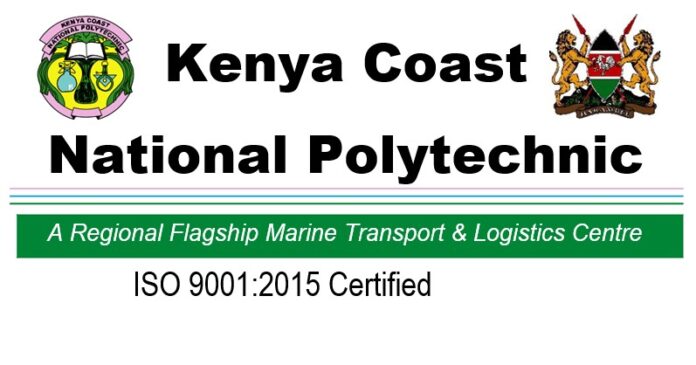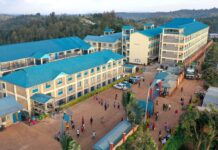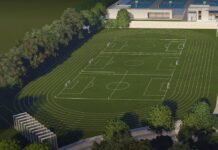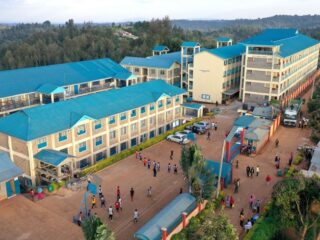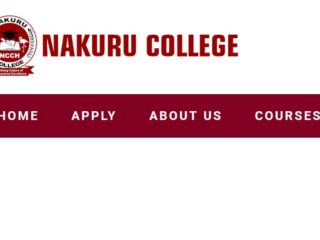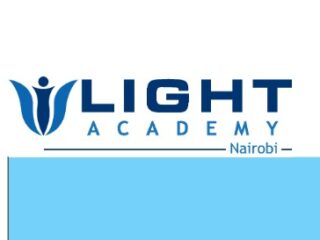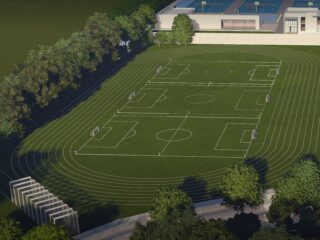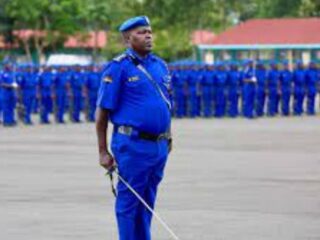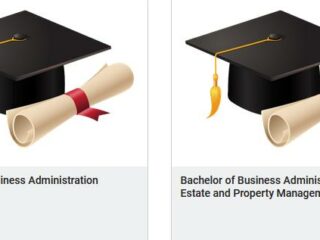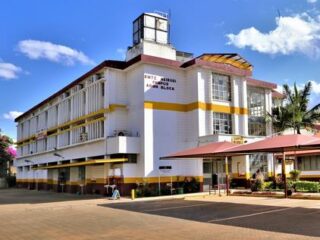List of courses offered at the Kenya National Polytechnic, admission requirements, fee structure and contacts:
Business Studies and Entrepreneurship department courses
KNEC Diploma Courses
All diploma courses take a maximum of three years delivered in three modules. Each module is examined by KNEC at the end of each academic calendar year. Currently, the department offers the following diploma courses examined by KNEC:
- Diploma in Human Resource Management
- Diploma in Business Management
- Diploma in Accounting
- Diploma in Banking & Finance
- Diploma in Secretarial Studies
- Diploma in Supply Chain Management
Entry Requirement
The minimum entry requirement for diploma courses is Kenya Certificate of Secondary Education (KCSE) C- (minus) or its equivalent craft certificate.
KNEC Craft Certificate Courses
All Craft certificate courses take a maximum of two years delivered in two modules. Each module is examined by KNEC at the end of each academic calendar year. The department currently offers the following craft certificate courses examined by KNEC:
- Craft Certificate in Human Resource Management
- Craft Certificate in Supply Chain Management
- Craft Certificate in Business Management
Entry Requirement
The minimum entry requirement for craft certificate courses is Kenya Certificate of Secondary Education (KCSE) mean grade D plain or an equivalent artisan certificate.
KASNEB Diploma and Professional Courses
Kenya Coast National Polytechnic is accredited by Kenya Accountants and Secretaries National Examinations Board (KASNEB) and the department has maintained its accreditation for many years through quality teaching and excellent results. The department offers the following diploma and professional KASNEB courses:
- Accounting Technician Diploma (ATD) Level I, II and III.
- Certified Public Accountant (CPA) Part I, II and III.
Entry Requirement
The minimum entry requirement is Kenya Certificate of Secondary Education (KCSE) C- (Minus) for Accounting Technician Diploma level I and C+ (Plus) for Certified Public Accountant Part I.KASNEB Certificate Level
The KASNEB certificate level takes a maximum of two years with examinations at the end of each level. The department currently offers the following KASNEB certificate course:
- Certificate Accounting and Management Skills (CAMS) Level I & II
- Entry Requirement
The minimum entry requirement is Kenya Certificate of Secondary Education (KCSE) D (Plain).
KNEC Artisan Courses
Artisan courses take one year to complete. Currently, the department offers the following artisan course:
- Artisan Certificate in Storekeeping
Entry Requirement
The minimum entry requirement for the artisan certificate course is Kenya Certificate of Primary Education (KCPE).
Mechanical Engineering department courses
he programmes include:
- Mechanical engineering (production option),
- Automotive engineering,
- Mechanical engineering (industrial plant option),
- Marine engineering,
- Seafarer,
- Refrigeration and air conditioning,
- Welding and fabrication,
- Motor vehicle mechanics,
- Motor vehicle electrics, and
- General fitter.
With the support of the Government through the Ministry of Education and the Polytechnic Council, the department is highly equipped with state of the art workshops having modern equipment including specialized diagnostic machines, computer numerical control (CNC) machines modern welding equipment and many others.
The department has a student population of more than 900 students. The department is the mother department for the newly established Regional Centre of Excellence in Marine Transport and Port Logistics, sponsored by the Government of Kenya and the World Bank.
DIPLOMA COURSES
- Diploma in Mechanical Engineering (Production Option)
This course is designed for Kenya Certificate of Secondary Education graduates (or equivalent qualifications), to provide trainees with skills knowledge and attitudes that will enable them perform and manage tasks in production Engineering and related fields and at the same time prepare them for further training.
The student applying for the course must have a Mean Grade of C- (Minus) and above at KCSE and they should have done and passed in Mathematics, Physic and English.
Admission of new students is done at the beginning of every term (January, May and September).
The course is modularized such that the trainee covers one module in one academic year (3 terms). The full course has a total of 3 modules.
- Diploma in Automotive Engineering
This course is designed for Kenya Certificate of Secondary Education graduates (or equivalent qualifications), to provide trainees with skills knowledge and attitudes that will enable them manage tasks in the Vehicle industry and related fields and at the same time prepare them for further training.
The student applying for the course must have a Mean Grade of C- (Minus) and above at KCSE and they should have done and passed in Mathematics, Physic and English.
Admission of new students is done at the beginning of every term (January, May and September).
The course is modularized such that the trainee covers one module in one academic year (3 terms). The full course has a total of 3 modules.
- Diploma in Mechanical Engineering (Industrial Plant Option)
This course is designed for Kenya Certificate of Secondary Education graduates (or equivalent qualifications), to provide trainees with skills knowledge and attitudes that will enable them perform and manage maintenance tasks in industrial plant and related fields and at the same time prepare them for further training.
The student applying for the course must have a Mean Grade of C-(Minus) and above at KCSE and they should have done and passed in Mathematics, Physic and English.
Admission of new students is done at the beginning of every term (January, May and September).
The course is modularized such that the trainee covers one module in one academic year (3 terms). The full course has a total of 3 modules.
CRAFT COURSES
- Craft Certificate In Marine Engineering
This course is designed for Kenya Certificate of Secondary Education graduates (or equivalent qualifications), to provide trainees with skills knowledge and attitudes that will enable them perform and manage maintenance tasks in marine vessels and related fields and at the same time prepare them for further training.
The student applying for the course must have a Mean Grade of D (plain) and above at KCSE.
Admission of new students is done at the beginning of every term (January, May and September).
The course is modularized such that the trainee covers one module in one academic year (3 terms). The full course has a total of 2 modules.
- Craft Certificate in Automotive Engineering
This course is designed for Kenya Certificate of Secondary Education graduates (or equivalent qualifications), to provide trainees with skills knowledge and attitudes that will enable them perform and manage maintenance tasks in vehicle and related fields and at the same time prepare them for further training.
The student applying for the course must have a Mean Grade of D (plain) and above at KCSE.
Admission of new students is done at the beginning of every term (January, May and September).
The course is modularized such that the trainee covers one module in one academic year (3 terms). The full course has a total of 2 modules.
- Craft Certificate in Mechanical Engineering
This course is designed for Kenya Certificate of Secondary Education graduates (or equivalent qualifications), to provide trainees with skills knowledge and attitudes that will enable them perform and manage tasks in production Engineering and related fields and at the same time prepare them for further training.
The student applying for the course must have a Mean Grade of D (plain) and above at KCSE.
Admission of new students is done at the beginning of every term (January, May and September).
The course is modularized such that the trainee covers one module in one academic year (3 terms). The full course has a total of 2 modules.
ARTISAN COURSES
- Artisan in Seafarer
This course is designed for Kenya Certificate of Primary Education (KCPE) graduates (or equivalent qualifications) and above, to provide trainees with skills knowledge and attitudes that will enable them perform maintenance tasks in marine vessels and related fields and at the same time prepare them for further training.
The student applying for the course must have completed KCPE.
Admission of new students is done at the beginning of every term (January, May and September).
The course is modularized such that the trainee covers one module in one academic year (3 terms). The full course has a total of 2 modules.
- Artisan in Refrigeration & Air Conditioning
This course is designed for Kenya Certificate of Primary Education (KCPE) graduates (or equivalent qualifications) and above, to provide trainees with skills knowledge and attitudes that will enable them perform repair maintenance tasks in refrigeration and air conditioning and related fields and at the same time prepare them for further training.
Admission of new students is done at the beginning of every term (January, May and September).
The course is modularized such that the trainee covers one module in one academic year (3 terms). The full course has a total of 2 modules.
- Artisan in Motor Vehicle Mechanics
This course is designed for Kenya Certificate of Primary Education (KCPE) graduates (or equivalent qualifications) and above, to provide trainees with skills knowledge and attitudes that will enable them perform repair maintenance tasks in motor vehicles and related fields and at the same time prepare them for further training.
Admission of new students is done at the beginning of every term (January, May and September).
The course is divided into grade III, II & I
- Artisan in Motor Vehicle Electrics
This course is designed for Kenya Certificate of Primary Education (KCPE) graduates (or equivalent qualifications) and above, to provide trainees with skills knowledge and attitudes that will enable them perform repair maintenance tasks in motor vehicle electrical systems and related fields and at the same time prepare them for further training.
Admission of new students is done at the beginning of every term (January, May and September).
The course is divided into grade III, II & I
- Artisan in Welding & Fabrication
This course is designed for Kenya Certificate of Primary Education (KCPE) graduates (or equivalent qualifications) and above, to provide trainees with skills knowledge and attitudes that will enable them perform welding and fabrication tasks and at the same time prepare them for further training.
Admission of new students is done at the beginning of every term (January, May and September).
The course is divided into grade III, II & I
- Artisan in General Fitter
This course is designed for Kenya Certificate of Primary Education (KCPE) graduates (or equivalent qualifications) and above, to provide trainees with skills knowledge and attitudes that will enable them perform general fitter tasks and at the same time prepare them for further training.
Admission of new students is done at the beginning of every term (January, May and September).
The course is divided into grade III, II & I
ASSESSMENT/EXAMINATIONS
Internal examinations are administered by the Polytechnic in form of continuous assessments and end of term examinations. At least two continuous assessment tests are administered per term except for the external examination term.
The trainee sits for a national examination at the end of each module. Progression to the next module is subject to successful completion and attainment of a pass in the previous module.
Field visits are organized according to lecturer’s requests to expose trainees to relevant industries in the trade areas.
National Examining Bodies
- All Diploma and Craft Courses are examined by Kenya National Examinations Council (KNEC).
- Artisan in Seafarer and Artisan in Refrigeration & Air Conditioning are examined by KNEC.
- Artisan in Motor Vehicle Mechanics, Motor Vehicle Electrics, General Fitter, Refrigeration & Air Conditioning and Welding & Fabrication are examined by the National Industrial Training Authority (NITA).
INDUSTRIAL ATTACHMENT
The students go for industrial attachment in the most relevant fields of their trade for at least 330 hours in module II. During the attachment term the trainee is exposed to the real world of work and applies the knowledge and skills attained in class.
Computing and Informatics courses
PROGRAMS
Diploma programs
o Diploma in Information Communication Technology examined by KNEC
o Diploma in Information Communication Technology examined by KASNEB
Certificate/Short Programs
o Certificate in Information Communication Technology examined by KNEC
o Cisco Certified Network Associate (CCNA)
o Certificate in Computer Maintenance & Networking
o Certificate in Computer Applications
International Computer Driving Licence (ICDL)
o Certificate In Programming
Proposed New Programs
o Huawei Certified Network Associate (HCNA)
o Microsoft Certified Solutions Developer (MCSD)
Electrical & Electronic Engineering department courses
The Department offers various programmes at Diploma, Craft certificate, Artisan and tailor made short courses. The programmes include:
- Diploma in Electrical Engineering (Power Option)
- Diploma in Telecommunication Engineering
- Diploma in Instrumentation and Control Engineering
- Craft Certificate in Electrical and Electronic Technology
- Craft Certificate in Telecommunication Engineering
- Electrical Installation (wireman) grade III, II,I
- Artisan in Electrical installation
- Solar Photovoltaic (SPV)
- Solar Water Heating (SWH)
- Electronic Mechanics
- Programmable Logic Controllers (PLC)
With the support of the Government through the Ministry of Education and the Polytechnic Council, the Department is highly equipped with state-of-the-art workshops having modern equipment including Motor Controls, Programmable Logic Controllers and others. Under the KEFEP Programme (Partnership between the Kenya Government and the Federal Government of Canada), the Department received modern equipment for the CBET Courses.
DIPLOMA COURSES
- Diploma in Electrical Engineering (Power Option)
This course is designed for Kenya Certificate of Secondary Education Graduates (or equivalent qualifications), to provide trainees with skills, knowledge and attitudes that will enable them perform and manage tasks in Electrical Engineering Power and related fields and at the same time prepare them for further training.
The student applying for the course must have a mean grade of C-(minus) and above at KCSE and should have done and passed Mathematics, Physics and English. Admission of new students is done in January, May and September. The course is modularised such that the trainee covers one module in one academic year (three terms); the full course has a total of three modules.
- Diploma in Telecommunication Engineering
This course is designed for Kenya Certificate of Secondary Education Graduates (or equivalent qualifications), to provide trainees with skills, knowledge and attitudes that will enable them perform and manage tasks in Telecommunication Engineering and related fields and at the same time prepare them for further training.
The student applying for the course must have a mean grade of C-(minus) and above at KCSE and should have done and passed Mathematics, Physics and English. Admission of new students is done in January, May and September. The course is modularised such that the trainee covers one module in one academic year (three terms); the full course has a total of three modules.
- Diploma in Instrumentation and Control Engineering
This course is designed for Kenya Certificate of Secondary Education Graduates (or equivalent qualifications), to provide trainees with skills, knowledge and attitudes that will enable them perform and manage tasks in Instrumentation and Control Engineering and related fields and at the same time prepare them for further training.
The student applying for the course must have a mean grade of C-(minus) and above at KCSE and should have done and passed Mathematics, Physics and English. Admission of new students is done in January, May and September. The course is modularised such that the trainee covers one module in one academic year (three terms); the full course has a total of three modules.
CRAFT COURSES
- Craft in Electrical and electronic Technology
This course is designed for Kenya Certificate of Secondary Education Graduates (or equivalent qualifications), to provide trainees with skills, knowledge and attitudes that will enable them perform and manage tasks in Electrical Installations (house wiring), Electrical maintenance and Fault diagnosis and related fields and at the same time prepare them for further training.
The student applying for the course must have a mean grade of D (PLAIN) and above at KCSE. Admission of new students is done in January, May and September. The course is modularised such that the trainee covers one module in one academic year (three terms); the full course has a total of two modules.
Craft Certificate in Telecommunication Engineering
This course is designed for Kenya Certificate of Secondary Education Graduates (or equivalent qualifications), to provide trainees with skills, knowledge and attitudes that will enable them perform and manage tasks in Telecommunication Engineering and related fields and at the same time prepare them for further training.
The student applying for the course must have a mean grade of D (PLAIN) and above at KCSE. Admission of new students is done in January, May and September. The course is modularised such that the trainee covers one module in one academic year (three terms); the full course has a total of two modules.
ARTISAN COURSES
- Artisan in Electrical Installation
This course is designed for Kenya Certificate of Primary Education (KCPE) graduates (or equivalent qualifications), to provide trainees with skills, knowledge and attitudes that will enable them perform and manage tasks in domestic wiring and related fields and at the same time prepare them for further training.
The student applying for the course must have completed KCPE. Admission of new students is done in January, May and September. The course is modularised such that the trainee covers one module in one academic year (three terms); the full course has a total of two modules.
- Electrical Installation (Wireman)
The course is divided into three grades; III, II, I.
This course is designed for Kenya Certificate of Primary Education (KCPE) graduates (or equivalent qualifications), to provide trainees with skills, knowledge and attitudes that will enable them perform and manage tasks in domestic wiring and related fields and at the same time prepare them for further training.
The student applying for the course must have completed KCPE. Admission of new students is done in January, May and September. The course is modularised such that the trainee covers grade III in one academic year (three terms); the full course takes three years.
SHORT COURSES
The following are short courses offered by the Department:
- Solar Photovoltaic (SPV)
- Solar Water Heating (SWH)
- Electronic Mechanics
- Programmable Logic Controllers (PLC)
These courses are designed to provide trainees with skills, knowledge and attitudes that will enable them perform and manage tasks in their fields of speciality. They are open to students who want to upgrade their skills. Admission of new students is done in January, May and September.
ASSESSMENT/EXAMINATION
Internal examinations are administered by the Polytechnic in the form of continuous assessments and end of term examinations. At least two assessment tests are administered per term except for the external examination term. The trainee sits for a national examination at the end of each module. Progression to the next module is subject to successful completion and attainment of a pass in the previous module.
Educational visits are organised according to lecturers’ requests to expose trainees to relevant industries in the trade areas.
National Examining Bodies
All Diploma, Craft and Artisan Courses are examined by the Kenya National Examination Council (KNEC)
Grade tests are examined by the National Industrial Training Authority (NITA).
Short courses are examined internally.
Applied Sciences department courses
The programs offered in the Department are:
DIPLOMA IN APPLIED BIOLOGY
The course is designed for KCSE graduates. It aims at equipping the trainees with skills, knowledge and attitudes to be highly competitive in the relevant industries and for further academic progression.
To qualify for admission, the trainee must have passed with a Mean Grade of C-(minus) and above in KCSE and they must have passed in Biology, Chemistry, Mathematics and English.
This is a modular program that runs for three years in 3 modules. Each module takes three terms. After completion of the second module, the trainees undergo a 3 months Industrial Attachment Session where they apply the skills learnt and experience the real world of work in the relevant Industries. During this period the trainees are assessed by the trainers and the supervisors in the Industries.
The trainees sit for internal examinations at the end of each of the first two terms of a module and at end of the final term (term three) they sit for the Kenya National Examinations Council examinations.
ntakes for the program are at the beginning of every term (January, May and September).
DIPLOMA IN ANALYTICAL CHEMISTRY
The course is designed for KCSE graduates. It aims at equipping the trainees with skills, knowledge and attitudes to be highly competitive in the relevant industries and for further academic progression.
To qualify for admission, the trainee must have passed with a Mean Grade of C-(minus) and above in KCSE and they must have passed in Chemistry, Biology/Physics, Mathematics and English.
This is a modular program that runs for three years in 3 modules. Each module takes three terms. After completion of the second module, the trainees undergo a 3 months Industrial Attachment Session where they apply the skills learnt and experience the real world of work in the relevant Industries. During this period, the trainees are assessed by the trainers and the supervisors in the Industries.
The trainees sit for internal examinations at the end of each of the first two terms of a module and at end of the final term (term three) they sit for the Kenya National Examinations Council examinations.
Intakes for the program are at the beginning of every term (January, May and September).
DIPLOMA IN FOOD SCIENCE AND TECHNOLOGY
The course is designed for KCSE graduates. It aims at equipping the trainees with skills, knowledge and attitudes to be highly competitive in the relevant industries and for further academic progression.
To qualify for admission, the trainee must have passed with a Mean Grade of C-(minus) and above in KCSE and they must have passed in Chemistry, Biology, Mathematics and English.
This is a modular program that runs for three years in 3 modules. Each module takes three terms. After completion of the second module, the trainees undergo a 3 months Industrial Attachment Session where they apply the skills learnt and experience the real world of work in the relevant Industries. During this period the trainees are assessed by the trainers and the supervisors in the Industries.
The trainees sit for internal examinations at the end of each of the first two terms of a module and at end of the final term (term three) they sit for the Kenya National Examinations Council examinations.
Intakes for the program are at the beginning of every term (January, May and September).
DIPLOMA IN ENVIRONMENTAL SCIENCE AND TECHNOLOGY
The course is designed for KCSE graduates. It aims at equipping the trainees with skills, knowledge and attitudes to be highly competitive in the relevant industries and for further academic progression.
To qualify for admission, the trainee must have passed with a Mean Grade of C-(minus) and above in KCSE and they must have passed in Chemistry, Biology, Mathematics and English.
This is a modular program that runs for three years in 3 modules. Each module takes three terms. After completion of the second module, the trainees undergo a 3 months Industrial Attachment Session where they apply the skills learnt and experience the real world of work in the relevant Industries. During this period the trainees are assessed by the trainers and the supervisors in the Industries.
The trainees sit for internal examinations at the end of each of the first two terms of a module and at end of the final term (term three) they sit for the Kenya National Examinations Council examinations.
Intakes for the program are at the beginning of every term (January, May and September).
CRAFT PROGRAMS
CRAFT CERTIFCATE IN SCIENCE LABORATRY TECHNOLOGY
The course is designed for KCSE graduates. It aims at equipping the trainees with skills, knowledge and attitudes to be highly competitive in the relevant industries and for further academic progression.
To qualify for admission, the trainee must have passed with a Mean Grade of D (plain) and above in KCSE and they must have passed in Chemistry, Biology, Mathematics and English.
This is a modular program that runs for two years in 2 modules. Each module takes three terms. After completion of the first module, the trainees undergo a 3 months Industrial Attachment Session where they apply the skills learnt and experience the real world of work in the relevant Industries. During this period the trainees are assessed by the trainers and the supervisors in the Industries.
The trainees sit for internal examinations at the end of each of the first two terms of a module and at end of the final term (term three) they sit for the Kenya National Examinations Council examinations.
Intakes for the program are at the beginning of every term (January, May and September).
CRAFT CERTIFICATE IN FOOD SCIENCE AND TECHNOLOGY
The course is designed for KCSE graduates. It aims at equipping the trainees with skills, knowledge and attitudes to be highly competitive in the relevant industries and for further academic progression.
To qualify for admission, the trainee must have passed with a Mean Grade of D (plain) and above in KCSE and they must have passed in Chemistry, Biology, Mathematics and English.
This is a modular program that runs for two years in 2 modules. Each module takes three terms. After completion of the first module, the trainees undergo a 3 months Industrial Attachment Session where they apply the skills learnt and experience the real world of work in the relevant Industries. During this period the trainees are assessed by the trainers and the supervisors in the Industries.
The trainees sit for internal examinational at the end of each of the first two terms of a module and at end of the final term (term three) they sit for the Kenya National Examinations Council examinations.
Intakes for the program are at the beginning of every term (January, May and September).
Fashion Design and Cosmetology department courses
| COURSE TITLE | MINIMUM ENTRY REQUIREMENT | MODE OF STUDY | EXAM BODY | DURATION |
| DIPLOMA IN FASHION DESIGN | KCSE MEAN GRADE C- | FULL TIME | KNEC | 3 Years |
| CRAFT CERTIFICATE IN FASHION DESIGN | KCSE MEAN GRADE D | FULL TIME | KNEC | 2 Years |
| ARTISAN CERTIFICATE IN DRESS MAKING | KCPE AND ABOVE | EVENING | NITA | 6 Months |
| ARTISAN CERTIFICATE IN TAILORING | KCPE AND ABOVE | EVENING | NITA | 6 Months |
| ARTISAN CERTIFICATE IN INTERIOR DECORATION | KCPE AND ABOVE | EVENING | KCNP | 1 Year |
| ARTISAN CERTIFICATE IN BEAUTY THERAPY AND HAIR DRESSING | OPEN | FULL TIME | NITA | 1 Year |
| ARTISAN CERTIFICATE IN HAIR CUTTING & BARBERING | OPEN | PART TIME | KCNP | 4 Weeks |
| CERTIFICATE IN WEAVING & BRAIDING | OPEN | PART TIME | KCNP | 4 Weeks |
| CERTIFICATE IN MANICURE & PEDICURE | OPEN | PART TIME | KCNP | 4 Weeks |
| CERTIFICATE IN MASSAGE | OPEN | PART TIME | KCNP | 3 Weeks |
Building and Civil Engineering department courses
DIPLOMA PROGRAMMES
Currently, the Department offers two diploma programmes.
- DIPLOMA IN BUILDING TECHNOLOGY
This is an engineering course where students cover areas related to construction of buildings. Units covered during the study include Mathematics, Surveying Estimate and Costing, Entrepreneurship, Structures, Construction Material, Measurement of Building Works, Construction Plants, CADD, Building Services, Technical Drawing, Concrete Technology.
- DIPLOMA IN CIVIL ENGINEERING
This is an engineering course where students are exposed to design construction of roads, bridges and dams. Units covered during their study include Mathematics, Surveying, Estimate and Costing, Technical Drawing, Entrepreneurship Education, Concrete Technology, Geology Technology, Structures, Construction Material, Construction Plants, Measurement of Building Works, Water Supply and Transport Engineering.
Entry Qualifications
The students applying for all Diploma courses must have a Mean Grade of C- (Minus) and above at KCSE and they should have done and passed Mathematics, Physics and English.
The course is modularized such that the trainee covers one module in one academic year (3 terms).
Intake
We have two intakes for the diploma programmes: May/September.
ASSESSMENT/EXAMINATIONS
Internal examinations are administered by the Polytechnic in form of continuous assessments and end of term examinations. The trainee sits for a National examination at the end of each module. Progression to the next module is subject to successful attainment of a pass in the previous module.
Course Work
It is a requirement that for every module, course work is sent to KNEC. These are marks from continuous assessment tests (CATS), assignments and end of term examinations.
Project Work
Trade Project is done in module III. Every student writes a proposal that has to be approved by the project panel before they proceed.
INDUSTRIAL ATTACHMENT
The students go for industrial attachment in the most related fields of their trade for at least 330 hours in module II.
During the attachment term, the trainee is exposed to the real world of work and applies the knowledge and skills attained in the Polytechnic. The trainee is assessed and graded during the industrial attachment.
Examining Body
At the end of each module, the trainee sits for the Kenya National Examinations Council (KNEC) examination.
CRAFT PROGRAMMES
The Department currently offers one craft certificate course.
CRAFT IN BUILDING TECHNOLOGY
Entry Qualification
The trainee intending to take this course must have attained a minimum mean grade D (plain) at KCSE.
The course is modularized such that the trainee covers one module in one academic year (3 terms).
Intake
We have two intakes for this course: May and September.
Examination Body
At the end of each module, the trainee sits for the KNEC examination.
ARTISAN PROGRAMMES
The Department currently offers three Artisan programmes. These are:
- Masonry,
- Plumbing, and
- Carpentry & Joinery.
Entry Qualification
The trainee intending to take an Artisan course must have sat the Kenya Certificate of Primary Education (KCPE) examination or above.
Curriculum
Artisan programmes are offered under the National Industrial Training Authority (NITA) Curriculum.
Examining Body
Artisan programmes are examined by NITA.
Hospitality and Tourism Management department courses
Admissions
Admission for new students is done in January May and September
COURSES OFFERED
Diploma Courses
All diploma courses are offered on modular basis with a total of three modules. The trainee is required to sit for the KNEC examinations at the end of each module.
Entry Requirement
Kenya Certificate of Secondary Education (KCSE) C- (minus) or its equivalent craft certificate
- Diploma in Catering & Accommodation Operations
- Diploma in Food & Beverage Management
- Diploma Tourism Management
Craft Courses
Craft courses are in two modules. The trainee will sit for KNEC examinations at the end of each module.
Entry Requirement
KSCE mean grade D plain and above or an equivalent artisan certificate
- Craft Certificate in Food & Beverage
- Craft Certificate in Tour Guiding & Travel Operations
- Craft Certificate in Front Office And Administration
- Mixology/Bartender Level 3
- Baking and Pastry Production Level 3
Artisan Courses
Artisan courses take one year to complete.
Entry Requirement
Kenya Certificate of Primary Education (KCPE)
- Artisan in Food and Beverage
- Artisan in Leisure and Recreation
Short Courses
These are short term courses designed by the Polytechnic to provide trainees with skills, knowledge and attitudes that will enable them perform well in the industry. On completion, the trainee is awarded an internal certificate by the Polytechnic.
Entry Requirement
Short courses are open to all
- Caking Making and Decoration – Two months
- Food Production – Three months
- Bread Making Techniques – Two months
- Housekeeping Laundry Techniques – Three months
- Event Planning Management – Six months
- Professional Waiter – Two months
- Tour Guiding Operations – Three months
ASSESSMENT/EXAMINATIONS
Internal examinations are administered by the Polytechnic in form of continuous assessment tests (CATs) and end of term examinations.
National Examinations
All diploma, craft and artisan courses are examined by Kenya National Examinations Council (KNEC).
Industrial Attachment
Students go for industrial attachment in their relevant fields of trade for at least three months. They are exposed to real world of work as they apply the skills and knowledge attained in class.
Liberal Studies department courses
- Diploma in Social Work and Community Development
This course is intended to equip the trainees with knowledge, skills and attitudes that are geared towards enabling them to perform and manage development activities in the society.
Duration of Course
The course is designed to take 3 years; split into module I, II and III. During the period, the trainee is required to go through 2,310 contact hours in the institution and 660 hours in the industry to gain exposure to the practical tasks expected in the world of work.
The module III course work is designed to provide the trainee with two areas of specialization;
- Diploma in Social Work
- Diploma in Community Development
Entry Requirements
To be admitted for the course, the trainee must have passed National Certificate in Social Development or passed Kenya Certificate of Secondary Education with an average grade of C-
- National Certificate in Social Development
This course is aimed to equip the trainees with the necessary knowledge, skills, attitudes and experiences that are geared towards enabling them to participate effectively in implementation of national social development policies.
Duration of Course
National Certificate in Social Development Course is designed to take 2 years of full time study comprising of classroom contact hours and industrial attachment.
Entry Requirements
To be eligible for the course, an applicant must have attained a minimum of Kenya Certificate of Secondary Education KCSE mean grade D.
For both programs the institution will offer internal examinations as course work and continuous assessment while Kenya National Examinations Council (KNEC) will offer external examinations.
Short Courses & University Programmes
University Programmes
Kenya Coast National Polytechnic has partnered with Masinde Muliro University of Science and Technology (MMUST) to offer courses in the Medical Sciences Department. These are:
- Diploma in Community Health and Development
- Certificate in Community Health and Development
- Diploma in Medical Biotechnology
- Certificate in Medical Biotechnology
Building and Civil Engineering department courses
DIPLOMA PROGRAMMES
Currently, the Department offers two diploma programmes.
- DIPLOMA IN BUILDING TECHNOLOGY
This is an engineering course where students cover areas related to construction of buildings. Units covered during the study include Mathematics, Surveying Estimate and Costing, Entrepreneurship, Structures, Construction Material, Measurement of Building Works, Construction Plants, CADD, Building Services, Technical Drawing, Concrete Technology.
- DIPLOMA IN CIVIL ENGINEERING
This is an engineering course where students are exposed to design construction of roads, bridges and dams. Units covered during their study include Mathematics, Surveying, Estimate and Costing, Technical Drawing, Entrepreneurship Education, Concrete Technology, Geology Technology, Structures, Construction Material, Construction Plants, Measurement of Building Works, Water Supply and Transport Engineering.
Entry Qualifications
The students applying for all Diploma courses must have a Mean Grade of C- (Minus) and above at KCSE and they should have done and passed Mathematics, Physics and English.
The course is modularized such that the trainee covers one module in one academic year (3 terms).
Intake
We have two intakes for the diploma programmes: May/September.
ASSESSMENT/EXAMINATIONS
Internal examinations are administered by the Polytechnic in form of continuous assessments and end of term examinations. The trainee sits for a National examination at the end of each module. Progression to the next module is subject to successful attainment of a pass in the previous module.
Course Work
It is a requirement that for every module, course work is sent to KNEC. These are marks from continuous assessment tests (CATS), assignments and end of term examinations.
Project Work
Trade Project is done in module III. Every student writes a proposal that has to be approved by the project panel before they proceed.
INDUSTRIAL ATTACHMENT
The students go for industrial attachment in the most related fields of their trade for at least 330 hours in module II.
During the attachment term, the trainee is exposed to the real world of work and applies the knowledge and skills attained in the Polytechnic. The trainee is assessed and graded during the industrial attachment.
Examining Body
At the end of each module, the trainee sits for the Kenya National Examinations Council (KNEC) examination.
CRAFT PROGRAMMES
The Department currently offers one craft certificate course.
CRAFT IN BUILDING TECHNOLOGY
Entry Qualification
The trainee intending to take this course must have attained a minimum mean grade D (plain) at KCSE.
The course is modularized such that the trainee covers one module in one academic year (3 terms).
Intake
We have two intakes for this course: May and September.
Examination Body
At the end of each module, the trainee sits for the KNEC examination.
ARTISAN PROGRAMMES
The Department currently offers three Artisan programmes. These are:
- Masonry,
- Plumbing, and
- Carpentry & Joinery.
Entry Qualification
The trainee intending to take an Artisan course must have sat the Kenya Certificate of Primary Education (KCPE) examination or above.
Curriculum
Artisan programmes are offered under the National Industrial Training Authority (NITA) Curriculum.
Examining Body
Artisan programmes are examined by NITA.
Fee payment details
Bank Name:KCB
Branch:Treasury Square
Account Name:Kenya Coast National Polytechnic
Account number:1106525183
Kenya Coast National Polytechnic Contacts
Kenya Coast National Polytechnic
Kisauni Road, Mombasa – Kenya
- O Box 81220 – 80100
Tel: +254 710 389 727 OR +254 712 725 554
Email: info@kenyacoastpoly.ac.ke
Fee Structure in PDF
- TVET FEE STRUCTURE FOR LEVEL 3, 4 & 6
- ICDL FEE STRUCTURE
- TVET FEE STRUCTURE 2022 APPLIED SCIENCE DEPARTMENT
- TVET FEE STRUCTURE 2022 BUSINESS AND MEDIA SUTDIES DEPARTMENT
- TVET FEE STRUCTURE 2022 ELECTRICAL AND ELECTRONICS ENGINEERING DEPARTMENT
- TVET FEE STRUCTURE 2022 HOSPITALITY & TOURISM DEPARTMENT
- TVET FEE STRUCTURE 2022 ICT DEPARTMENT
- TVET FEE STRUCTURE 2022 MECHANICAL, BUILDING & CIVIL ENGINEERING DEPARTMENTS
- TVET FEE STRUCTURE 2022 MEDICAL SCIENCE DEPARTMENT
- TVET FEE STRUCTURE 2022 SECRETARIAL AND LIBERAL STUDIES DEPARTMENT
- COMPUTER APPLICATIONS & CCNA 2022
- HAIR DRESSING AND BEAUTY THERAPY
- TVET FEE 2022 KCNP AND MASINDE MULIRO UNIVERSITY
- LANGUAGES FEES STRUCTURE

